Lugh – Mighty God Of Light, Sun And Crafts In Celtic Beliefs
A. Sutherland - AncientPages.com - Lugh, whose name means "the shining," is one of the greatest heroes of Irish folklore. He is known under different names but is usually mentioned as Lugh of the Long Arms (sometimes, "Long Hands" or even "Artful Hands").
Celtic God Lugh. Credit: Adobe Stock - AiAdvocate.org
Lugh - the most powerful of the Celtic gods - is the god of all arts and crafts. Worshiped as the sun god, he symbolizes enlightenment and brings light to the world.
We can still recognize his name in many historic sites on the European continent. Names like Lugdunum ("the fortress of Lugha") which is today the French city of Lyon and the Dutch city of Leiden, of which name has in the past erroneously been associated with the Roman outpost Lugdunum Batavorum. Carlisle (England) was once Luguvalium, a town near Hadrian's Wall in Roman Britain and Wales. Lugh was worshiped as Lleu, while in the regions of Gaul as Lugus.
Who Is The Celtic God Lugh?
Our earlier article on Ancient Pages described how Lugh came into the world. Lugh was born from the relationship between Ethne, the daughter of the Fomorian king Balor and a young man, Cian (Kian), who belonged to Tuatha Dé Danann. Tailtiu was Lugh's foster mother, and his adoptive father was the god of the sea, Manannán mac Lir, who was older than the Tuatha de Danaan tribe people but considered one of them.
Relief of a three-faced god from northeastern Gaul believed to be Lugus, the Gaulish equivalent of Lugh. Credit: QuartierLatin1968 - CC BY-SA 3.0
Lugh was a beautiful fair-haired god with a shining face. He was the owner of a formidable spear, never missing its goal. It was an "extension of his arm," and thus, he became known as Lugh "of the Long Arms."
Lugh Appears In The Palace Of King Nuada
The Tuatha de Danann were governed unfairly by the Fomorian king Balor. Despite being half-Fomorian, Lugh wanted to fight on the side of the Dananns and help them to defeat the Fomorians.
At first, he was not particularly trusted when he, one day, arrived at the gate of king Nuada's palace as a stranger. The gatekeeper wanted to know his profession. He was refused entrance to the hall because no one was admitted without being the master of some craft.
"I am a carpenter," said the stranger.
The gatekeeper replied that the king already had a skilled carpenter and did not need another.
"Then tell the king I am a master smith."
"We already have a smith," answered the gatekeeper.
"Then I am a warrior, too," said the stranger.
Credit: Adobe Stock - La Cassette Bleue
"We do not need one," replied the gatekeeper. "The great Ogma is our champion."
The stranger proposed all possible professions he mastered, even poet, harpist, scientist, physician, sorcerer, and sculptor. Each time, he was told that king Nuada already had such a professional at court.
"Then ask the king," said the stranger (Lugh) to the gatekeeper, "if he has with him a man of all these crafts at once, for if he has, there is no need for me at Tara."
Eventually, Lugh was allowed in because he had mastered many skills. The Tuatha de Danann admired his strength and intelligence and called him Samildanach ("Many-Skills"). He became the Tuatha's temporary king when Nuada lost his hand in battle, and after Nuada's death, Lugh became the Tuatha's rightful king.
The Fomorians were finally defeated, and Lugh's brave accomplishment helped bring freedom to the Irish.
Image source: Gods and Demons Wiki
Lugh led the Dananns against the Fomorians in the second and final battle of Mag Tuired. He killed his grandfather Balor by piercing him through his evil eye with a slingshot and cutting off his head.
At the same time, he fulfilled an old Druid prophecy saying that Balor, the Fomorian tyrannical king, would be killed by his grandson, so it happened.
Lugh was also the spiritual guide of his son, Cuchulainn, and fought in his son's place to give him rest during his lone and very tiring combat.
Lugh's most famous weapon was called the "Invincible Spear" or the "Spear of Victory," with properties similar to the Sword of Nuada - when thrown, it momentarily hit its target.
The spear was blazingly hot and became hotter the longer it was used. It was stored in a vat of water at night to keep it from catching fire and scorching the earth.
Written by – A. Sutherland AncientPages.com Staff Writer
Updated on January 21, 2023
Copyright © AncientPages.com All rights reserved. This material may not be published, broadcast, rewritten or redistributed in whole or part without the express written permission of AncientPages.com
Expand for referencesReferences:
Leeming, D. The Oxford Companion to World Mythology
Sjoestedt, Marie-Louise. Celtic Gods and Heroes
History, Hourly. Celtic Mythology
More From Ancient Pages
-
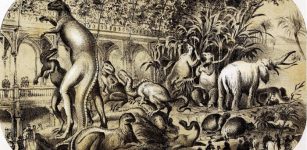 New Study Reveals Who Destroyed New York’s First Dinosaur Museum
News | May 29, 2023
New Study Reveals Who Destroyed New York’s First Dinosaur Museum
News | May 29, 2023 -
 El Mirador: Ancient Pyramids Hidden In The Lost City Of The Maya
Featured Stories | Aug 1, 2018
El Mirador: Ancient Pyramids Hidden In The Lost City Of The Maya
Featured Stories | Aug 1, 2018 -
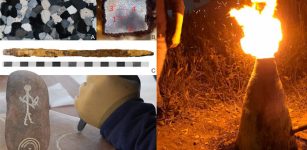 Steel Was Already Being Used In Europe 2,900 Years Ago – New Study
Archaeology | Mar 1, 2023
Steel Was Already Being Used In Europe 2,900 Years Ago – New Study
Archaeology | Mar 1, 2023 -
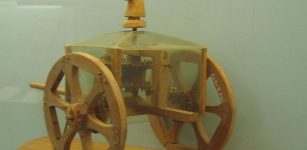 Remarkable South-Pointing Chariot – Ancient Cybernetic Machine Invented 1,700 Years Ago Is An Engineering Masterpiece
Ancient Technology | Jul 17, 2014
Remarkable South-Pointing Chariot – Ancient Cybernetic Machine Invented 1,700 Years Ago Is An Engineering Masterpiece
Ancient Technology | Jul 17, 2014 -
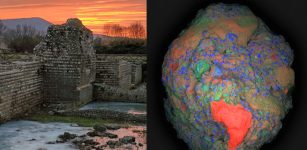 Ancient Riddle Solved – Why Was Roman Concrete So Durable?
Archaeology | Jan 7, 2023
Ancient Riddle Solved – Why Was Roman Concrete So Durable?
Archaeology | Jan 7, 2023 -
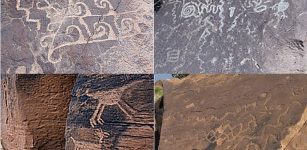 Lyman Lake Petroglyphs And Famous Kokopelli-Flute Player Left By Ancestors Of The Hopi Indians
Civilizations | Nov 26, 2018
Lyman Lake Petroglyphs And Famous Kokopelli-Flute Player Left By Ancestors Of The Hopi Indians
Civilizations | Nov 26, 2018 -
 Did The Viking Blood Eagle Ritual Ever Happen Or Was It A Misunderstood Story?
Archaeology | Dec 21, 2021
Did The Viking Blood Eagle Ritual Ever Happen Or Was It A Misunderstood Story?
Archaeology | Dec 21, 2021 -
 Only Known Roman ‘Lorica Squamata’ Legion Armor Restored
Archaeology | Jun 27, 2024
Only Known Roman ‘Lorica Squamata’ Legion Armor Restored
Archaeology | Jun 27, 2024 -
 Clues What Tiggered Climate Change 8,000 Years Ago Found In Scotland
News | Sep 15, 2023
Clues What Tiggered Climate Change 8,000 Years Ago Found In Scotland
News | Sep 15, 2023 -
 Well-Preserved 7,300-Year-Old Wooden Cabins Discovered In La Draga
Archaeology | Oct 23, 2023
Well-Preserved 7,300-Year-Old Wooden Cabins Discovered In La Draga
Archaeology | Oct 23, 2023 -
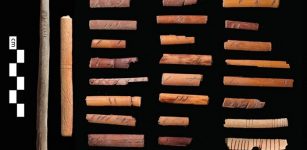 America’s First Casino Was Created By The Promontory Culture 700 Years Ago
Ancient History Facts | Apr 30, 2016
America’s First Casino Was Created By The Promontory Culture 700 Years Ago
Ancient History Facts | Apr 30, 2016 -
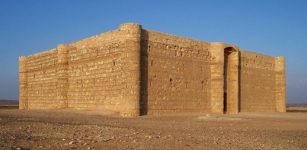 Strange Desert Castle Qasr Kharana In Jordan
Featured Stories | Oct 1, 2019
Strange Desert Castle Qasr Kharana In Jordan
Featured Stories | Oct 1, 2019 -
 Dendra Armor – 3,500-Year-Old Mycenae Armor Was Suitable For Extended Combat
Archaeology | May 22, 2024
Dendra Armor – 3,500-Year-Old Mycenae Armor Was Suitable For Extended Combat
Archaeology | May 22, 2024 -
 Unclear Purpose Of Mysterious Rock-Cut City Of Petra – Was It A Fortress Or Sacred City?
Featured Stories | May 30, 2020
Unclear Purpose Of Mysterious Rock-Cut City Of Petra – Was It A Fortress Or Sacred City?
Featured Stories | May 30, 2020 -
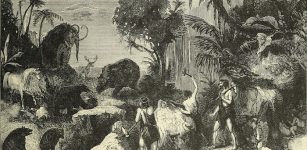 Ancient Human Feeding Behavior Studied By Scientists
Archaeology | Jan 18, 2022
Ancient Human Feeding Behavior Studied By Scientists
Archaeology | Jan 18, 2022 -
 Brilliant Prehistoric Cave Paintings Of Lascaux – Who Were Their Unknown Creators?
Civilizations | Jun 2, 2014
Brilliant Prehistoric Cave Paintings Of Lascaux – Who Were Their Unknown Creators?
Civilizations | Jun 2, 2014 -
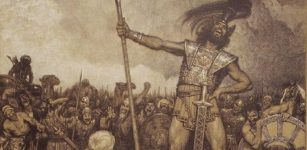 Skull Of Biblical Giant Goliath Is Buried On The Hill Golgotha In Jerusalem – New Claim
Archaeology | Nov 7, 2019
Skull Of Biblical Giant Goliath Is Buried On The Hill Golgotha In Jerusalem – New Claim
Archaeology | Nov 7, 2019 -
 LIDAR Discovers Huge Abandoned Zapotec City With Temples, And Ball Courts In Oaxaca, Mexico
Archaeology | Jan 30, 2025
LIDAR Discovers Huge Abandoned Zapotec City With Temples, And Ball Courts In Oaxaca, Mexico
Archaeology | Jan 30, 2025 -
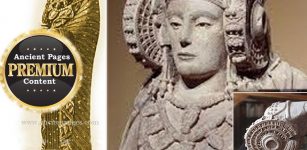 Mystery Of Lady Of Elche – Puzzling Artifact Of An Unknown Queen Or Priestess
Ancient Mysteries | May 22, 2014
Mystery Of Lady Of Elche – Puzzling Artifact Of An Unknown Queen Or Priestess
Ancient Mysteries | May 22, 2014 -
 Being Left-Handed Was A Sign Of Evil Until Only Recently
Ancient History Facts | Jun 29, 2018
Being Left-Handed Was A Sign Of Evil Until Only Recently
Ancient History Facts | Jun 29, 2018




